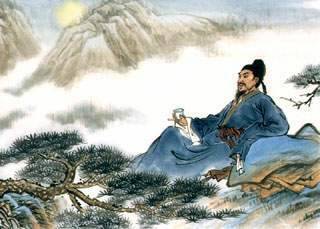Wang Wei (701~761), sometimes titled the Poet Buddha, was a Tang Dynasty Chinese poet, musician, painter and statesman.
王维(701~761),人称“诗佛”,唐代诗人、音乐家、画家、政治家。
From a high family, he passed the civil service entrance examination in 721 and had a successful civil service career, rising to become Chancellor in 758.
王维出身于官僚地主家庭,721年通过科举考试,仕途得意,758年官至尚书右丞。

During the An Lushan Rebellion he avoided actively serving the insurgents during the capital's occupation by pretending to be deaf.
安史之乱长安被占期间,王维为了不给叛军当差而装聋。
He spent ten years studying with the Chan master Daoguang.
王维师从道光禅师学习10年。
After his wife's death in 730, he did not remarry and established a monastery on part of his estate.
730年妻子去世后,王维未再婚娶,将他的辋川庄地建为佛寺(清源寺)。
He is best known for his quatrains depicting quiet scenes of water and mist, with few details and little human presence.
王维最为著名的是刻画宁静的水雾景色的绝句。在这些绝句里,王维极少提到人的存在。
The Indiana Companion comments that he affirms the world's beauty, while questioning its ultimate reality.
《印第安纳中国传统文学指南》评价说,王维确认世界的美丽,但是质疑它的最终真实性。
It also draws a comparison between the deceptive simplicity of his works and the Chan path to enlightenment, which is built on careful preparation but is achieved without conscious effort.
《指南》也比较了王维作品表面上的质朴与禅学通向开悟境界的途径。禅学的开悟建基于精心的准备,但是要想达到开悟的境界并不需要有意识的努力。
None of his original paintings survive, but copies of works attributed to him are also landscapes with similar qualities.
王维的亲笔画作没有流传下来,但是归到他名下的摹本也是具有同样特质的风景画。
He influenced what became known as the Southern school of Chinese landscape art, which was characterised by strong brushstrokes contrasted with light ink washes.
王维对后来以落笔着力、水墨渲淡为特征的南方山水画派有很大的影响。
Wang Wei's most famous poetry, such as the poem “Deer Park”, form a group titled Wang River Collection.
王维最著名的诗歌《鹿柴》被收人《辋川集》。
They record a poet's journey, ostensibly that of Wang Wei and his close friend, Pei Di. They are far more universal than a simple journey and have inspired generations of poets since, including recent adaptations such as Pain Not Bread's Introduction to Wang Wei, Barry Gifford's Replies to Wang Wei, and Gary Blankenship's A River Transformed. Eliot Weinberger and Octavio Paz's 19 Ways of Looking at Wang Wei is a brilliant essay concerning more than 19 translations of Wang Wei's "Deer Park".
这些诗记录了一个诗人(很显然是王维和他的朋友袭迪)的旅程,但是它们远比简单的一次旅程要深远的多,并且影响了后代诗人的创作。近来受其影响的有:帕因·诺特·布莱德的《王维导论人门》,巴里·吉福德的《答王维》以及加里·布兰肯西普的《变形的河流》。艾略特·温伯格和奥科塔维奥·帕斯的《19种解读王维的方法》,这篇精彩的论文考察的是王维《鹿柴》的19个以上版本的译文。
One of Wang Wei's poems, called Weicheng Qu Or Song of the City of Wei has been adapted to the famous music melody, Yangguan Sandie or Three Refrains on the Yang Pass.
王维的《渭城曲》后来被改编成名曲《阳关三叠》。
The most famous version of this melody is that of the guqin, whichWang Wei probably played.
该曲最著名的版本是古琴版,很可能王维亲自用古琴演奏过该曲。












